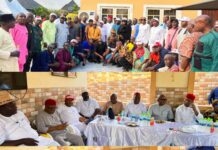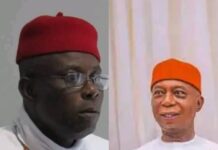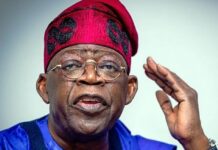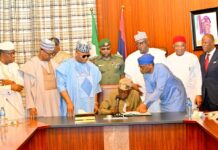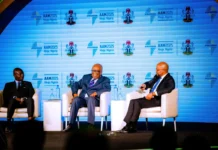By Okonta Emeka Okelum
INTRODUCTION
As Nigeria commemorates Democracy Day on June 12, a date entrenched in the nation’s history as a symbol of the struggle for democratic governance, critical questions arise about the state of Nigeria’s democracy today. The annulment of the June 12, 1993, presidential election—widely regarded as the freest and fairest in Nigeria’s history—marked a dark period in the nation’s political evolution. Decades later, while Nigeria has maintained a civilian government since 1999, concerns persist over whether democracy is truly thriving or under threat.
THE LEGACY OF JUNE 12 AND NIGERIA’S DEMOCRATIC JOURNEY.
June 12 represents more than just a date; it embodies the resilience of Nigerians in demanding accountable leadership. The 1993 election, won by Chief MKO Abiola, was a watershed moment that demonstrated the possibility of a united Nigeria transcending ethnic and religious divides. However, its annulment by the military regime under General Ibrahim Babangida exposed the fragility of democratic transitions in the country.
Since the return to civilian rule in 1999, Nigeria has held six consecutive general elections, yet each cycle has been marred by allegations of rigging, voter intimidation, and judicial interventions in electoral outcomes. The 2023 elections, in particular, were heavily contested, with opposition parties and civil society groups raising concerns about irregularities and the independence of the Independent National Electoral Commission (INEC).
SIGNS OF DEMOCRATIC EROSION
Several indicators suggest that Nigeria’s democracy may be facing significant threats:
- Electoral Integrity Under Scrutiny:
Despite technological advancements like the Bimodal Voter Accreditation System (BVAS) and the INEC Results Viewing Portal (IReV), the 2023 elections were criticized for logistical failures and discrepancies in result transmission. The European Union Election Observation Mission noted “a lack of transparency and operational deficiencies,” raising doubts about the credibility of the process. - Rising Political Violence and Suppression:
Election-related violence remains a recurring issue. According to the Armed Conflict Location & Event Data Project (ACLED), over 600 incidents of political violence were recorded in the lead-up to the 2023 polls. Additionally, there are growing concerns about press freedom, with journalists and activists facing intimidation for criticizing the government. - Judicialization of Politics:
The increasing reliance on courts to determine electoral outcomes—rather than the ballot box—has led to what some analysts describe as “judicial coups.” In 2023, several governorship elections were overturned by tribunals, creating scepticism about the judiciary’s impartiality. - Economic Hardship and Citizen Disillusionment:
A struggling economy, rising poverty, and unemployment have eroded public trust in democratic governance. The World Bank reports that over 104 million Nigerians live in poverty, while inflation has soared to nearly 34% (as of May 2024). When citizens perceive democracy as failing to improve their lives, support for authoritarian alternatives may grow.
THE ROLES OF INSTITUTIONS IN SAFEGUARDING DEMOCRACY.
Strong institutions are the backbone of any democracy. However, in Nigeria, key democratic institutions face challenges:
1) INEC’s Credibility Crisis:
Despite reforms, INEC’s inability to conduct flawless elections undermines confidence in the electoral process. Delayed result uploads, underage voting in some regions, and allegations of bias have fueled distrust.
2) The National Assembly and Executive Overreach:
The legislature, meant to serve as a check on executive power, often appears weakened by partisan politics. Frequent defections, rubber-stamp approvals of executive decisions, and a lack of vigorous oversight raise concerns about accountability.
3) The Media and Civil Society Under Pressure:
A free press and active civil society are essential for democracy. However, recent attacks on journalists (such as the detention of FIJ’s Daniel Ojukwu) and restrictive laws like the Social Media Bill suggest shrinking civic space.
COMPARATIVE PERSPECTIVE: HOW DOES NIGERIA FARE IN AFRICA?
While Nigeria struggles with democratic backsliding, it is not alone in Africa. Countries like Mali, Burkina Faso, and Niger have experienced military takeovers, citing governance failures. However, nations like Ghana and South Africa have maintained stronger democratic traditions through independent institutions and robust civil engagement.
Nigeria’s democracy, though imperfect, remains one of Africa’s most influential. If it falters, the ripple effects could destabilize the West African region.
IS THERE STILL HOPE FOR NIGERIAN DEMOCRACY?
Despite these challenges, Nigeria’s democracy is not beyond redemption. Civil society organizations, the media, and youth-led movements continue to advocate for transparency and accountability.
The #NotTooYoungToRun movement, for instance, has empowered younger candidates to contest electionssignallingng a shift toward inclusive governance.
Moreover, the judiciary, though sometimes controversial, remains a critical check on executive power. The Supreme Court’s recent rulings against attempts to undermine state autonomy (as seen in local government financial control cases) demonstrate that democratic institutions can still function effectively.
THE WAY FORWARD: KEY RECOMMENDATIONS.
To strengthen democracy, Nigeria MUST fix:
- Electoral Reforms – INEC must regain public trust by ensuring transparent, technology-driven elections with full adherence to the Electoral Act.
- Judicial Independence – The judiciary must resist political interference and uphold fairness in election disputes.
- Protection of Press Freedom – The government should drop repressive media bills and ensure journalists can operate without fear.
- Economic Reforms – Reducing poverty and unemployment will restore faith in democracy as a viable system.
- Civic Education – Citizens must be educated on their rights and the importance of participation beyond elections.
CONCLUSION
As Nigeria marks another Democracy Day, the question remains: Is democracy under threat? The answer lies in the willingness of political leaders, institutions, and citizens to safeguard the principles of June 12—free and fair elections, respect for the rule of law, and government accountability. Without urgent reforms to strengthen electoral integrity, reduce political violence, and restore public confidence, Nigeria risks sliding further into democratic backsliding.
The spirit of June 12 must not be reduced to mere symbolism; it should serve as a constant reminder that democracy is not a destination but a continuous struggle.
REFERENCES:
- European Union Election Observation Mission, Nigeria 2023 General Elections Final Report.
- Armed Conflict Location & Event Data Project (ACLED), Nigeria Political Violence Trends (2022-2023)
- World Bank, Nigeria Development Update (2024)
- International Press Institute (IPI), Press Freedom Reports on Nigeria (2023-2024).
- Centre for Democracy and Development (CDD), Post-2023 Election Review.
About the author.
Okonta Emeka Okelum is an online journalist, social analyst, governance activist, sustainable development enthusiast, and grassroot community development champion, with special focus on governance, democracy, rule of law, politics, human rights, and development in Nigeria.
Follow him on
asabapost@gmail.com
